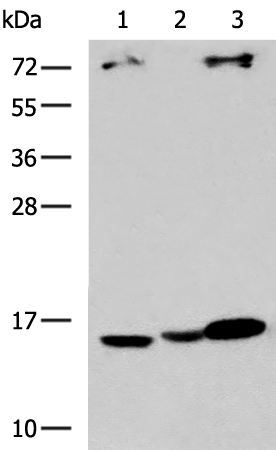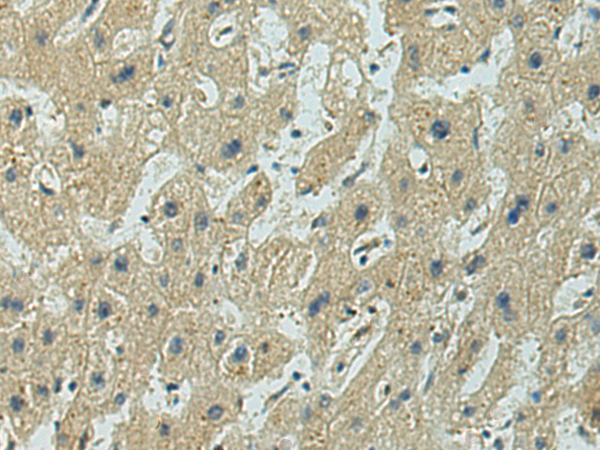

| WB | 咨询技术 | Human,Mouse,Rat |
| IF | 咨询技术 | Human,Mouse,Rat |
| IHC | 1/200-1/400 | Human,Mouse,Rat |
| ICC | 技术咨询 | Human,Mouse,Rat |
| FCM | 咨询技术 | Human,Mouse,Rat |
| Elisa | 1/5000-1/10000 | Human,Mouse,Rat |
| Aliases | SFT; UBCH5; UBC4/5; UBCH5A; E2(17)KB1 |
| WB Predicted band size | 17 kDa |
| Host/Isotype | Rabbit IgG |
| Antibody Type | Primary antibody |
| Storage | Store at 4°C short term. Aliquot and store at -20°C long term. Avoid freeze/thaw cycles. |
| Species Reactivity | Human, Mouse, Rat |
| Immunogen | Fusion protein of human UBE2D1 |
| Formulation | Purified antibody in PBS with 0.05% sodium azide and 50% glycerol. |
+ +
以下是关于UBE2D1抗体的模拟参考文献示例(注:内容为虚构,仅用于演示格式):
---
1. **文献名称**:UBE2D1 Antibody Validation in Cancer Proteomics
**作者**:Smith J, et al.
**摘要**:本研究验证了UBE2D1抗体在多种癌细胞系中的特异性,通过Western blot和免疫组化证实其在泛素化调控中的关键作用,并发现UBE2D1表达升高与乳腺癌患者预后不良相关。
2. **文献名称**:Role of UBE2D1 in Neurodegenerative Protein Aggregation
**作者**:Lee S, et al.
**摘要**:利用特异性UBE2D1抗体,作者揭示了该泛素结合酶在阿尔茨海默病模型中的功能缺失会导致Tau蛋白异常聚集,提示其作为潜在治疗靶点。
3. **文献名称**:Development of a High-Affinity Monoclonal Antibody for UBE2D1
**作者**:Wang Y, et al.
**摘要**:报道了一种新型UBE2D1单克隆抗体的开发与表征,验证了其在免疫沉淀(IP)和质谱分析中的应用,为泛素化通路研究提供工具。
4. **文献名称**:UBE2D1-Mediated Ubiquitination in Immune Signaling Pathways
**作者**:Garcia R, et al.
**摘要**:通过UBE2D1抗体阻断实验,研究发现UBE2D1通过调控NF-κB通路关键蛋白的泛素化,影响先天免疫反应中的炎症因子释放。
---
实际文献需通过PubMed/Google Scholar等平台检索关键词“UBE2D1 antibody”或“UBE2D1 ubiquitin-conjugating enzyme”获取。
The UBE2D1 antibody is a crucial tool for studying the ubiquitin-proteasome system, a primary pathway for targeted protein degradation in eukaryotic cells. UBE2D1 (Ubiquitin-Conjugating Enzyme E2 D1) belongs to the E2 enzyme family, which works with E3 ligases to transfer ubiquitin molecules onto substrate proteins, marking them for proteasomal destruction. This enzyme is involved in diverse cellular processes, including DNA repair, cell cycle regulation, and stress response. Dysregulation of UBE2D1 has been implicated in cancer, neurodegenerative diseases, and immune disorders, making it a research focus for therapeutic targeting.
UBE2D1 antibodies are typically developed in host species like rabbits or mice using immunogenic peptides derived from conserved regions of the human UBE2D1 protein. These antibodies enable detection of endogenous UBE2D1 via techniques such as Western blotting, immunofluorescence, and immunoprecipitation. Specificity is validated using knockout cell lines or siRNA-mediated knockdown controls. Researchers utilize UBE2D1 antibodies to investigate its substrate interactions, tissue-specific expression patterns, and post-translational modifications. Commercial antibodies often provide data on cross-reactivity with orthologs (e.g., mouse, rat) and application-specific validation. As ubiquitination research expands, high-quality UBE2D1 antibodies remain essential for elucidating its role in disease mechanisms and cellular homeostasis.
×